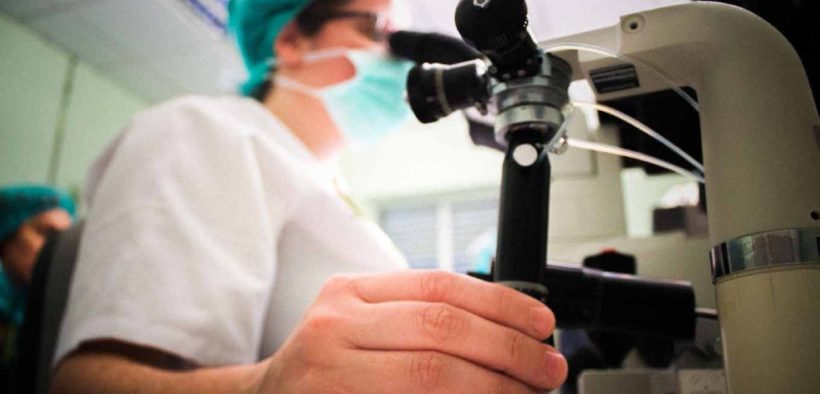New Drug To Win

Indian scientists indigenously create the country’s first cancer-treating molecule with fewer side effects.
By Anila Mathew
Cancer: probably all of us have had to deal with its debilitating effects at some point in our lives when it has affected someone close to us. The rise in the incidence of this dreaded disease in recent years must have rendered most of us hopeless and skeptical. But a group of 24 researchers from across the country are giving us reason to see the light glimmering at the end of the tunnel. The treatment of cancerous growths in the body has been plagued by side effects and ineffectiveness, despite the many different methods followed in the past. As the incidence of cancer grows, there remains a pressing need for newer and better medication. In recent times, chemotherapy has been replaced by targeted therapy, wherein only the specific cancerous cells are identified and treated. Small molecule compounds or monoclonal antibodies are created, synthesized, and investigated to help stop the proliferation of cancerous cells alone, unlike chemotherapy that affects normal cells too. Research has also revealed that 66% of cancers are caused due to random mistakes during cell division, underlining the importance of precision medicines.
In an unprecedented move, scientists in the country created history by indigenously designing and synthesizing India’s first-ever cancer-curing molecule with limited side effects, Disarib, last year. The team, consisting of 24 researchers from eight different research groups across various labs within India and the UK, tasted success after eight years of collaborative research. The team included a group of researchers under the leadership of Prof. Sathees C Raghavan of the Department of Biochemistry at the Indian Institute of Science (IISc), Bengaluru. Teams led by Prof. Avadhesha Surolia, Prof. N Yathindra, Prof. Vibha Choudhary, Prof. Subhas Karki, Prof. Nagesh Kolakonda, Prof. T R Santhosh Kumar and Prof. Pritha Ray were also part of the pathbreaking development.
The new molecule, which is an apoptosis-inducer, causes cancer cells that overproduce protein BCL2 to die a controlled death. However, since many other proteins that have different functions share structural similarity to BCL2, molecules synthesized earlier to inhibit this regulator protein were found to have negative side effects, particularly in reducing the platelet count. Disarib, synthesized at Prof. Karki’s laboratory in Karnataka’s KLE College of Pharmacy, has proved to have significantly fewer side effects and is more effective than the FDA approved ABT199 that is, at present, the best inhibitor in the market.
“We are working towards a bigger version of the study,bringing in more Chemists and linicians.It will be quite a while before we can decide whether it will hit the markets.However,It looks very Promising.”
Prof. Sathees C Raghavan
Department of Biochemistry, IISc
In its preliminary tests, the molecule was found to be effective against various cancers, except in the treatment of breast cancer, cervical cancer, and chronic myelogenous leukemia, since the expression of BCL2 is low in such cases. “In all the cases, our molecule was performing better than the ABT199, which is why we decide to patent this molecule”, says Prof. Raghavan. The research team has filed for an Indian patent and has also initiated the process of filing an application for the Patent Cooperation Treaty that grants intellectual property protection across the world. Though the initial findings have been greatly encouraging, there is a long road ahead before Disarib can actually be used to cure the terminal disease. chicago
The team, consisting of 24 researchers from eight different research groups across various labs within India and the UK, tasted success after eight years of collaborative research.
A number of preclinical trials have to be performed before the approval for clinical trials come through. The molecule has been tested on mice, cancer cell lines, and patient samples so far. “We have experimentally tested Disarib in all possible systems, and its efficiency in selectively killing cancer cells was high,” says Supriya V Vartak, IISc researcher and one of the first authors of the study. The preclinical tests, titled Glue Grant, will be conducted under the aegis of the Department of Biotechnology, New Delhi. For this multi-crore project, cancer biologists, clinicians, specialists, and chemists in bioinformatics from across different laboratories in India will work together. “There were a number of criticisms initially,” recollects Prof. Raghavan, “So we designed more experiments, brought in more experts, and came up with more and more evidence to support our findings. Currently, some pharmaceutical companies have shown an interest in our molecule, which is very encouraging. We are working towards a bigger version of the study, bringing in more chemists and clinicians. It will be quite a while before we can decide whether it will hit the markets. However, it looks very promising.” Indeed, the development of a better, more effective anti-cancer drug is promising, not just for scientists or the pharmaceutical industry. It is the promise of better health and brighter hope for each of us.
















